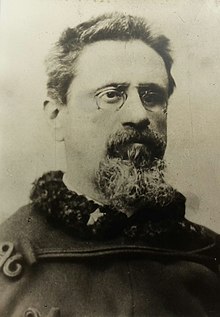| This article's lead section may be too short to adequately summarize the key points. Please consider expanding the lead to provide an accessible overview of all important aspects of the article. (January 2025) |
| Cesare Airaghi | |
|---|---|
 | |
| Born | (1840-10-04)4 October 1840 Milan, Kingdom of Lombardy–Venetia, Austrian Empire |
| Died | 1 March 1896(1896-03-01) (aged 55) Adwa, Tigray, Ethiopia |
| Allegiance | |
| Branch | |
| Years of service | 1859 – 1896 |
| Rank | |
| Battles / wars | Second Italian War of Independence |
| Alma mater | University of Pavia |
Cesare Airaghi (1840-1896) was an Italian colonel and war hero who participated in several conflicts during the 19th century. Airaghi participated in the Second Italian War of Independence, the Third Italian War of Independence and the First Italo-Ethiopian War before being killed at the Battle of Adwa.
Early years
Cesare was born on 4 October 1840, as the son of Giovanni Battista and Marietta Lattuada at Milan. When he was 14, his father was killed and Cesare was forced to be responsible for his family's finance. While attending the University of Pavia, Airaghi enlisted in the 9th Infantry Regiment and participated in the Second Italian War of Independence. He was appointed as Second Lieutenant of the 17th Infantry Division and fought at the Battle of Palestro. After the war, Airaghi resumed his studies at the University of Pavia and eventually graduated as an engineer.
Military career
Airaghi was promoted to Lieutenant on 17 June 1861, while at the 28th Infantry Regiment and to captain on 14 July 1866. He then participated in the Third Italian War of Independence and fought the Austrians at Borgosatollo and Levico. After the war, he returned to the 28th Infantry Regiment from 1874 to March 1878 and two months later, he was promoted to major. He then proceeded to work as a tactical teacher at the Royal Academy of Turin [it] in July 1883 and was promoted to lieutenant colonel in April 1884. Around 1888, Airaghi was given command of the 77th Infantry Regiment and promoted to Colonel in October 1888. Around September 1889, Airaghi was sent to Eritrea and stationed at the Asmara–Keren area before being transferred to Massawa. In January 1890, he took part in an expedition to Ethiopia under the command of Baldassarre Orero before returning to the Italian mainland in October of the same year. He was then given command of the 36th Infantry Regiment but left on 1 August 1893, following a request to become a auxiliary.
Battle of Adwa

On 13 January 1896, Airaghi was called to Eritrea to participate in the First Italo-Ethiopian War as he commanded the 6th African Infantry Regiment as part of the 2nd Brigade of the Right column. On the evening of 29 February, Airaghi began his march towards Adwa, reaching the Rebbi Arienni on March 1. During the Battle of Adwa, he conducted repeated assaults on the Ethiopian forces with enthusiasm and courage. Despite his success at keeping the Ethiopian forces back, they were beginning to outnumber Airaghi's regiment and they surrounded and he was killed in the fighting. Airaghi was posthumously awarded the Gold Medal of Military Valor on 1 March 1896, for his command at Adwa and a plaque was placed in Milan in memory.
References
- ^ Ancfargl (30 December 2015). "AIRAGHI Cesare - Associazione Nazionale Combattenti FF.AA. Regolari Guerra di Liberazione". Associazione Nazionale Combattenti FF.AA. Regolari Guerra di Liberazione (in Italian). Retrieved 18 June 2022.
- ^ "Chi era Costui - Scheda di Cesare Airaghi" (in Italian). Retrieved 5 December 2007.
- Raymond Jonas (29 November 2011). The Battle of Adwa: African Victory in the Age of Empire. Harvard University Press. p. 176. ISBN 978-0674062795. Retrieved 19 June 2022.
- ^ "AIRAGHI Cesare – MOVM". Movm (in Italian). Retrieved 19 June 2022.
- "Le onorificenze della Repubblica Italiana" (in Italian). Retrieved 4 January 2014.